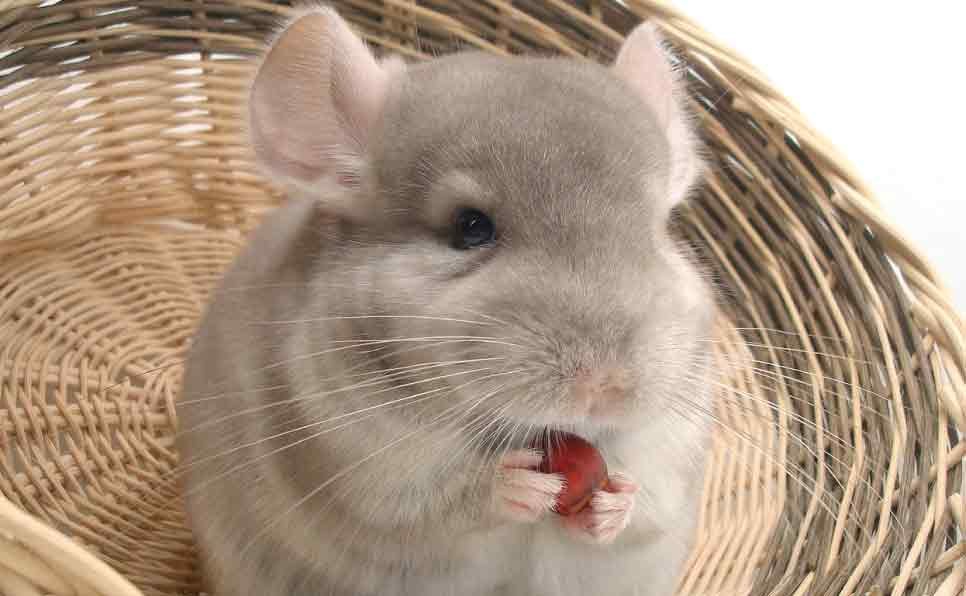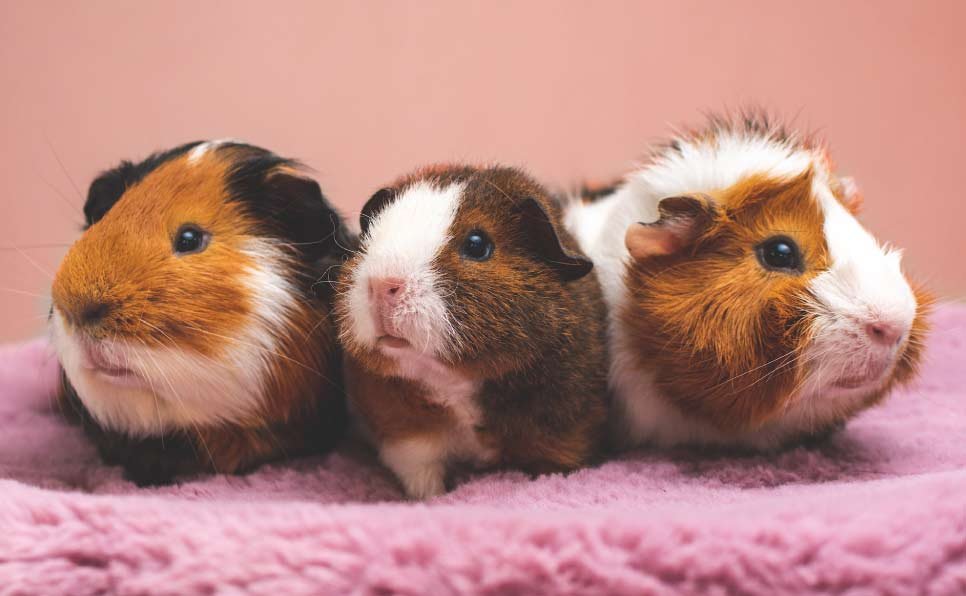At PetSweetJoy, we sometimes share products we truly love and use with our own pets. This post contains affiliate links, which means we may earn a small commission, at no extra cost to you. We only recommend products that fit our values of care, comfort, and responsible pet parenting. 💗
Are chinchillas good pets for beginners? These adorable rodents are trendy, but their care needs might surprise you. Learn about their lifespan, temperament, space requirements, and more before bringing one home!
Chinchillas are unique and captivating pets, however, when considering if they are suitable for beginners, it’s essential to understand their specific care requirements, lifespan, and behavioral traits.
In this article, you will learn:
- The lifespan and care needs of chinchillas, highlighting their long-term commitment.
- Dietary, environmental, and social requirements, critical for their well-being.
- Common challenges faced by new pet owners, including finding specialized veterinary care.
- The pros and cons of chinchilla ownership, providing a balanced view to help you make an informed decision.
- Alternatives to chinchillas for those seeking a more beginner-friendly pet.
While chinchillas can be rewarding pets, they may not be the best choice for all beginners due to their specific care needs and long-term commitment. For those ready to meet these requirements, chinchillas offer a unique companionship.
However, we invite you to continue reading the complete article. Let’s get started!
Chinchillas as Pets for Beginners
Have you been captivated by the adorable chinchillas gracing your social media feed? Their irresistibly soft fur and curious personalities can certainly steal hearts. But before welcoming a chinchilla into your home, it’s important to understand their needs and the commitment involved. Chinchillas are not low-maintenance pets. While they can be rewarding companions, their specific care requirements might not align with every lifestyle.
Addressing Social Media Misconceptions
Social media portrays chinchillas often as cuddly companions enjoying playtime. While some chinchillas may become accustomed to gentle handling, they are naturally shy animals and prefer minimal interaction. Their dust baths, a crucial part of their care routine, might also be mistaken for playtime but serve the essential purpose of keeping their fur healthy.
Understanding Chinchilla Characteristics
- Lifespan: Chinchillas are surprisingly long-lived pets, with an average lifespan of 10-20 years. This is a significant commitment, and potential owners should be prepared to care for their chinchilla well into their own adulthood.
- Temperament: As mentioned earlier, chinchillas are on the shy side. They are active at night (crepuscular) and may spook easily during the day. However, with patient socialization and a calm environment, they can become accustomed to human interaction and even enjoy gentle playtime outside their cage.

Assessing the Suitability of Chinchillas for Beginners
Chinchillas may be captivating creatures, but are they the ideal pet for a beginner? This section dives into their specific needs to help you decide if their care requirements align with your lifestyle.
The Unique Needs of Chinchillas
Chinchillas Diet and Nutrition
Chinchillas have a specialized digestive system adapted to a low-sugar, high-fiber diet. Their primary food source should be a high-quality chinchilla pellet formulated to meet their nutritional needs. Alfalfa hay should also be provided for essential roughage to aid digestion and keep their teeth worn down. Fresh water should be available at all times.
If you’re new to chinchilla care, the Chinchilla Food Starter Package is the perfect way to begin. It includes everything your pet needs to start a healthy diet, timothy hay cubes, pellets, and a multivitamin booster, all made from premium natural ingredients. This starter kit for chinchilla owners simplifies feeding time and ensures your pet gets balanced nutrition right from the start.
Potential Dietary Challenges:
- Strict Diet: Chinchillas are sensitive to dietary changes and sugary treats. Introducing new foods too quickly or offering inappropriate snacks can lead to digestive upset.
- Hay Selection: Not all hays are created equal. Choose timothy or oat hay as their primary hay source, avoid alfalfa hay as a main food source for adult chinchillas due to its higher protein and calcium content.
A balanced diet is key to a healthy chinchilla. Chinchilla diet with Rose Hips is specially formulated to support digestion, immunity, and overall vitality. Made from freshly harvested timothy and alfalfa hay pellets blended with dried rose hips, this mix is rich in Vitamin C, fiber, and natural antioxidants, exactly what chinchillas need for a strong immune system and a shiny coat. Pair it with high-quality hay for a complete daily diet.
Understanding the Commitment
A Long-Term Responsibility
Owning a chinchilla is a long-term responsibility. Their extended lifespan means they’ll be a part of your life for many years. Be sure you’re prepared to provide them with proper care, attention, and financial resources throughout their lives.
Financial Considerations
Chinchillas require an initial investment for their cage, accessories, food, and vet care. Beyond the initial setup, there will be ongoing costs for:
- Food
- Bedding
- Dust bath mix
- Regular veterinary checkups
Unexpected health issues can also incur additional veterinary expenses. It’s important to factor in all these costs before bringing a chinchilla home.
By carefully considering these points, you can make an informed decision about whether a chinchilla is the right pet for you. In the next sections, we’ll delve deeper into their specific needs and explore the challenges and rewards of chinchilla ownership.

Social and Environmental Needs
Are Chinchillas Social Animals? Chinchillas are not inherently social creatures. While some chinchillas may tolerate or even enjoy companionship, they generally prefer solitude. Housing multiple chinchillas together can actually lead to stress and fighting.
Environmental Needs:
- Temperature: Chinchillas thrive in cool, dry environments with temperatures between 60-75 degrees Fahrenheit (15-24 degrees Celsius). They are sensitive to overheating and can suffer heatstroke in hot temperatures.
- Dust Baths: Unlike many small pets, chinchillas never bathe in water, they roll in dust to keep their dense fur clean. The Chinchilla Dust is much better if it is 100% volcanic ash, free of chemicals and additives. It helps maintain a soft, glossy coat while distributing natural oils evenly. Offering a dust bath several times per week for 10-15 minutes at a time, is one of the most enjoyable and essential parts of chinchilla grooming.
Challenges for New Pet Owners
Space and Exercise Requirements
- Large Enclosures: Chinchillas are energetic animals that require ample space to exercise. A multi-level cage with a minimum base area of 4 square feet is essential. They are excellent climbers, so vertical space is crucial for enrichment. Exercise wheels are also a great way for them to expend energy.
- Daily Exercise: Beyond cage space, chinchillas need daily supervised playtime outside their enclosure. This allows them to stretch their legs, explore their surroundings, and engage in natural behaviors like jumping and climbing.
Nighttime Activity and Noise
- Crepuscular Critters: Chinchillas are most active at dawn and dusk (crepuscular). This means they may be quite rambunctious during the night when you’re trying to sleep. Their activity can include running on their wheel, chewing, and vocalizing.
- Potential Noise Levels: Chinchillas can produce a variety of sounds, including barking, clicking, and chewing. While not typically deafening, these noises may be disruptive to those who are sensitive to nighttime sounds.
By understanding these unique needs and potential challenges, you can make a more informed decision about whether a chinchilla is the right pet for you. In the next section, we’ll explore the financial considerations and weigh the pros and cons of chinchilla ownership.

The Cost of Owning a Chinchilla
Owning a chinchilla can be a rewarding experience, but it’s important to understand the financial commitment involved. The cost of owning a chinchilla can vary significantly based on initial setup, ongoing care, and unexpected health issues.
Initial Setup and Ongoing Expenses
The initial setup for your chinchilla’s new home and the ongoing expenses are critical components of chinchilla care:
- Cage: A large, multi-level cage is recommended to ensure enough space for exercise. Costs can range from $100 to $300. Your chinchilla’s home should be spacious, safe, and easy to maintain. The Chinchilla Cage & Starter Pack provides the perfect setup for young chinchillas, with chew-proof metal bars, shelves, and ladders that encourage climbing and exercise. It should include a food dish, water bottle, and treats, everything your pet needs. Once your chinchilla grows, you can easily upgrade to a larger cage.
- Accessories: This includes shelves, hiding places, and chew toys. Expect to spend $50 to $100 initially. Healthy teeth are crucial for every chinchilla. Chew Sticks that includes apple, plum, and willow sticks, all natural, safe, and perfect for keeping your pet’s teeth properly trimmed. Besides dental benefits, these chew sticks provide mental stimulation and prevent boredom, helping your chinchilla stay happy and active.
- Food: Chinchillas require a high-fiber diet consisting mainly of hay and specialized pellets. Monthly food expenses can be around $20 to $40.
- Veterinary Care: Regular check-ups are essential, and initial costs for vaccinations or health checks can be $50 to $100 per visit. To keep your chinchilla’s coat shiny and their immune system strong, consider adding VitaGlow Supplement to their routine. This all-natural formula contains Omega 3 and 6 fatty acids, vitamin E, and biotin, all essential nutrients for skin and coat health. It promotes a soft, glossy fur texture and supports long-term vitality from the inside out.
Remember, these are ongoing costs, especially food and veterinary care, which will add up over the lifespan of your pet.
Unexpected Costs and Considerations
While regular expenses can be planned for, unexpected costs often catch chinchilla owners by surprise:
- Health Problems: Dental issues, respiratory infections, and gastrointestinal problems are common in chinchillas. These can lead to unexpected vet visits costing hundreds of dollars.
- Emergency Care: In case of an emergency, treatment costs can quickly escalate, sometimes exceeding $1,000.
- Replacement Accessories: Chinchillas are known to chew on almost everything. You may need to replace chewed items regularly to ensure their safety.
Adoption or Responsible Breeding
Before purchasing a chinchilla from a pet store, consider adopting from a rescue organization or choosing a responsible breeder. These options can not only reduce initial costs but also ensure the chinchilla’s health and well-being:
- Adoption: Often includes a health check and initial vaccinations, potentially lowering initial veterinary costs.
- Responsible Breeders: Provide health records and lineage information, ensuring the chinchilla is less likely to have genetic health issues.
The cost of owning a chinchilla requires careful financial planning and consideration, especially regarding the pet’s origin. By choosing to adopt or purchase from a reputable breeder, you not only potentially save on initial costs but also contribute to responsible pet ownership and animal welfare.

Pros and Cons of Chinchillas as Pets
Deciding to bring a chinchilla into your home is a significant decision. Understanding the pros and cons of chinchillas as pets can help you determine if they are the right fit for your lifestyle and household.
Advantages of Chinchilla Ownership
Chinchillas can make delightful pets for the right owner, thanks to several positive attributes:
Longevity and Cleanliness
- Long Lifespan: Chinchillas have a remarkable lifespan, often living 10 to 20 years with proper care, offering a long-term companionship.
- Low Odor: Unlike many other small pets, chinchillas produce very little odor, making them an excellent choice for indoor living.
Allergy Considerations and Personality Traits
- Potential Allergy Benefits: Due to their fur density, chinchillas typically carry fewer allergens compared to other pets, potentially making them suitable for allergy sufferers.
- Quiet Personalities: Chinchillas are relatively quiet creatures, making them suitable for apartment living or households that prefer a more peaceful environment.
Disadvantages and Challenges
However, there are also several considerations to keep in mind:
Dietary Restrictions and Space Requirements
- Specialized Diet: Chinchillas require a high-fiber diet mainly consisting of hay and special pellets, which can be more costly and demanding than other pets’ diets.
- Spacious Cage Needs: They need large, multi-level cages to accommodate their active lifestyle, which can be a significant initial investment and require ample space in your home.
Social Needs and Veterinary Care
- Same-Species Companionship: Chinchillas are social animals and often thrive when they have companionship from another chinchilla, which means adopting more than one, leading to additional care and costs.
- Veterinary Care Challenges: Finding a veterinarian with experience treating chinchillas can be challenging, as they are considered exotic pets. This can lead to higher medical costs and difficulty obtaining necessary care.
Understanding the pros and cons of chinchillas as pets is essential for any prospective owner. While they offer long-term companionship and have low odor, the need for a specific diet, spacious living conditions, and potential challenges in finding specialized veterinary care are critical considerations.

Making an Informed Decision: Are Chinchillas Right for You?
Deciding whether a chinchilla is the right pet for you requires careful consideration and thorough understanding of their specific needs and characteristics. Making an informed decision about chinchilla ownership is crucial to ensure the well-being of both the pet and the owner.
Key Considerations for Potential Owners
Before welcoming a chinchilla into your home, revisit the key points from previous discussions:
- Lifespan and Commitment: Chinchillas can live for 10-20 years, requiring a long-term commitment from their owners.
- Care Requirements: They need a high-fiber diet, spacious living conditions, and specific temperature control to stay healthy.
- Social and Behavioral Needs: Understanding their quiet, yet social and active nature is crucial for their well-being.
- Veterinary Care: Be prepared for the challenge of finding a specialized vet and the costs associated with exotic pet care.
Common Mistakes to Avoid
Avoiding certain pitfalls can make chinchilla ownership more rewarding and less stressful:
- Impulse Buying: Avoid purchasing a chinchilla on a whim without fully understanding their care requirements.
- Not Researching Needs: Failing to research their dietary, social, and environmental needs can lead to health and happiness issues.
- Improper Cage Setup: Providing an inadequate living space can severely impact a chinchilla’s health and well-being. Ensure the cage is large, safe, and properly equipped.
Signs of a Happy vs. Unhappy Chinchilla
Observing your chinchilla’s behavior and physical condition can help you assess their happiness:
- Signs of a Happy Chinchilla:
- Regular eating and drinking habits.
- Active, playful, and curious behavior.
- Normal, healthy fur and clear, bright eyes.
- Comfortable and relaxed around familiar people.
- Signs of an Unhappy Chinchilla:
- Changes in appetite or water consumption.
- Lethargy, aggression, or hiding behaviors.
- Dull, patchy, or fur loss, which may indicate stress or illness.
- Signs of discomfort or distress when handled or around people.
Making an informed decision about bringing a chinchilla into your life involves understanding their specific needs, recognizing the common mistakes to avoid, and being able to identify the signs of their well-being. By considering these factors, you can ensure a happy and healthy life for your chinchilla and a rewarding experience as a pet owner.

Are chinchillas good pets for beginners? Frequently Asked Questions (FAQs)
While chinchillas can be friendly and enjoy gentle handling after they are comfortable with their owner, they are not typically cuddly pets. They are naturally shy and prefer short interactions over long cuddle sessions.
Chinchillas can be litter trained to a certain extent. They tend to designate specific areas in their cage for toileting, and a litter box can be placed in these areas. However, they may not always use it perfectly, and some chinchillas never fully litter train.
No, chinchillas should never be bathed with water! Their fur has special oils that keep it healthy, and water baths can remove these oils and damage their fur. Instead, they require a dust bath filled with chinchilla-specific volcanic dust to maintain their fur's health.
Chinchillas are not typically loud pets during the day. However, since they are crepuscular and most active at dawn and dusk, they may be noisy at night with running on their wheel, chewing, and vocalizations. This can be disruptive for those who are sensitive to nighttime sounds.
Chinchillas are not social animals and generally don't do well living with other pets. Cannot be kept with other animals (rabbits, guinea pigs etc.) Housing multiple chinchillas together can lead to stress, fighting, and injuries. If you decide to have two should be two but of the same sex.
Regular veterinary checkups are important for chinchillas, just like any other pet. Finding a veterinarian experienced with exotic pets is crucial, as chinchillas have specific needs that a general vet may not be familiar with. Discuss a preventative care plan with your veterinarian to ensure your chinchilla lives a long and healthy life.
Regular veterinary checkups are important for chinchillas, just like any other pet. Finding a veterinarian experienced with exotic pets is crucial, as chinchillas have specific needs that a general vet may not be familiar with. Discuss a preventative care plan with your veterinarian to ensure your chinchilla lives a long and healthy life.
Conclusion
Deciding to add a pet to your life is a significant decision, especially for beginner pet owners. In considering whether chinchillas are suitable pets for beginners, it’s essential to weigh the commitment against the unique care needs these animals present.
Final Thoughts on Chinchilla as Suitable Pets for Beginners
Chinchillas can be charming and rewarding companions, but they require a significant amount of care, a long-term commitment, and specific living conditions:
- Long-term Commitment: Remember, chinchillas have a lifespan of 10-20 years.
- Care Needs: They require a high-fiber diet, spacious and cool living conditions, and social interaction.
- Health and Well-being: Prospective owners must be prepared to find specialized veterinary care.
Given these considerations, chinchillas may not be the best choice for all beginner pet owners. They are suited for individuals who can commit to their long-term care and are willing to learn about their specific needs.
Alternatives to Consider for New Pet Owners
If you’re a beginner pet owner and feel that a chinchilla might not be the right fit, there are other small pets that may be better suited to your current situation:
- Guinea Pigs: Known for their friendly and docile nature, guinea pigs can be excellent pets for beginners. They still require a good amount of space and social interaction but are generally easier to care for than chinchillas.
- Hamsters: If space is a constraint, hamsters might be a suitable alternative. They are nocturnal like chinchillas but have shorter lifespans and less complex dietary needs.
- Rabbits: While rabbits also require space and specific diets, they can be litter-trained and might be more interactive than chinchillas.
Each of these alternatives has its own set of care requirements and commitments, so it’s important to research and consider which pet would best fit your lifestyle and capabilities.
In conclusion, while chinchillas offer unique companionship, they demand significant time, resources, and knowledge for proper care. Beginner pet owners should thoroughly assess their ability to meet these needs and consider other pet options that might better align with their current experience and lifestyle.
Affiliate Disclosure:
This article contains affiliate links. If you click on one of these links and make a purchase, I may earn a small commission at no extra cost to you. I only recommend products I truly believe in and have researched carefully. These commissions help support the maintenance of this blog and allow me to keep sharing free, helpful pet care content with you. Thank you for your support!




